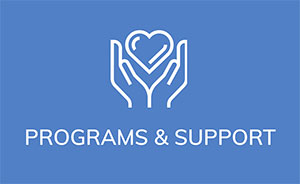Over the course of a year of monthly meetings, The CLL Bloodline will teach the BASICS needed to understand CLL, bring news, help with acronyms and new vocabulary, and offer simple fun quizzes.
MONTHLY QUIZ: CLL (chronic lymphocytic leukemia) and SLL (small lymphocytic lymphoma):
- Are entirely different unrelated cancers.
- Are related but different cancers.
- Are identical cancers in different parts of the body; SLL in the nodes only, CLL in the blood and maybe the lymph nodes.
- SLL may become CLL.
- 3 and 4 are correct.
ANSWER: The correct answer is #5. To diagnose CLL there must be > 5000 identical or clonal cells per microliter (μl) of blood. In SLL, clonal cells with the same immunophenotyping (genetic fingerprinting), as in CLL, are found in at least one lymph node, but there are < 5000 of these cells per μl of blood. SLL becomes CLL if the count exceeds 5000.
NEWS:
- November is National Family Caregivers Month! It’s the perfect time to honor the people in your life – a doctor, nurse, clergy, family member, or friend – who have made an invaluable contribution to your physical or mental health on your journey with CLL by making a tribute gift to CLL Society in their name during the month of November.
- BeiGene, the manufacturer of BRUKINSA® (zanubrutinib), is looking for patients to share their treatment experience on BRUKINSA. If you have been taking this medication for ≥ 6 months and would be willing to share your story to help support other patients, please visit BRUKINSA.com/yourstory.
- Join us on November 16th for the Facebook Live event “Ask Me Anything” featuring Dr. Sameer Parikh,
- Thank you to everyone who has completed a Community Profile Questionnaire and please do so if you haven’t already. This questionnaire is found in the survey section of the website and will help us better understand the community that we serve as a nonprofit organization to support more targeted and effective programs and resources. Identifiable information will be kept confidential and not disclosed outside of CLL Society.
- CLL Society will send out the support group survey in November. Please complete the survey as it helps us demonstrate the value and impact of these groups, and can help call attention to ways we can improve.
THE BASICS: Types of Treatment
Cellular Therapies are treatments that use cells rather than drugs to treat CLL. The first cellular therapy was a hematopoietic stem cell transplant (HSCT), or a bone marrow transplant. In CLL, this is usually done using a matched donor’s stem cells. It may be curative, but it is high risk due to infections and graft versus host disease, where the new immune system attacks not just the cancer but can also attack the patient’s skin, eyes, and gut commonly effected (GVHD). CAR-T (chimeric antigen receptor – T cells) is experimental in CLL where our own T-lymphocytes are harvested, trained to attack our CLL, grown, and then re-infused. There is no GVHD as it’s the patients’ own cells. Response rates are common for this “living drug” in those with few remaining options but the durability of the remission is less certain. Neurotoxicity and cytokine release syndrome (CRS), where inflammatory molecules (cytokines) are released causing flu-like symptoms or worse, can occur and rarely be fatal. However, they can almost always be successfully managed. Other cellular therapies include CAR-NK (natural killer) cells and TILs (tumor infiltrating lymphocytes), but they are even less mature in CLL.
WORD/ACRONYM OF THE MONTH: Allogeneic Hematopoietic Stem Cell Transplant (HSCT)
Allogeneic stem cell transplant is a procedure in which hematopoietic (blood forming) stem cells are taken from a genetically matched donor (often a sibling or unrelated donor) and given to the patient through an IV. The cells migrate to and hopefully engrafts in the patient’s marrow, providing new stem cells to build all the blood components, and with it, a new immune system that recognizes and attacks the cancer as an invader. This is the desired outcome, called “Graft versus Leukemia (GVL).” It is still used in CLL, but much less often now due to new therapies including CAR-T that are usually tried first.
The CLL Society is invested in your long life. Please invest in the long life of the CLL Society

















